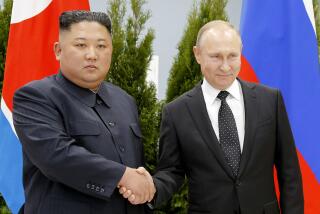Russia Investigates Alleged Chemical Arms Smuggling : Weapons: Ex-chief of disarmament program, now a politician, is accused of sending supplies to Syria.
- Share via
MOSCOW — The former head of Russia’s chemical weapons disarmament program is under investigation for allegedly smuggling nearly a ton of chemical weapons into the Middle East in 1993, Russian authorities have confirmed.
A leading chemical weapons activist said Tuesday that federal authorities suspect Anatoly D. Kuntsevich of delivering to Syria laboratory equipment and a shipment of an acid that can be used to make chemical weapons.
Kuntsevich has denied any wrongdoing and said he is being framed by unidentified people who want to undermine his attempts to cooperate with the West in destroying Russia’s chemical weapons stockpiles.
Kuntsevich, one of the Soviet Union’s foremost chemical weapons designers, headed a secret defense research and testing institute in southern Russia for 10 years. Then came perestroika, and the award-winning Hero of Socialist Labor was put in charge of overseeing the dismantling of Russia’s chemical arsenal. He was regarded with great suspicion by the Western arms control community, which viewed him as a fox assigned to guard the henhouse.
“He was one of those people who give me the heebie-jeebies,” said a Washington-based chemical weapons expert who asked not to be identified. “You just never got the feeling that he was being straight with you. . . . This guy pushed all my alarm bells.”
Those suspicions were heightened last year when whistle-blower Vil S. Mirzayanov alleged that under Kuntsevich, Russia had continued secret development and testing of a powerful new binary chemical weapon, despite the Russians’ international commitments not to do so.
President Boris N. Yeltsin fired Kuntsevich last year with the terse announcement that the retired army general had committed “numerous and gross violations.”
*
It was not until Kuntsevich appeared on the list of candidates for December’s parliamentary election--running as a member of extremist Vladimir V. Zhirinovsky’s Liberal Democratic Party--that the Russian Federal Security Service, or FSB, went public with the allegations against him.
Col. Gen. Mikhail I. Barsukov, the new head of the FSB, one of two successor agencies to the KGB, reported to the Central Election Commission that Kuntsevich was under investigation for smuggling. Upon hearing the news, Zhirinovsky’s party dumped Kuntsevich from its ticket, election commission Chairman Nikolai T. Ryabov announced Sunday.
On Monday, a spokesman for the FSB said Kuntsevich was one of a group of people who had arranged to have 1,760 pounds of chemicals shipped to the Middle East. The group later tried to smuggle five tons of “dual-purpose” chemicals obtained from military factories, but Russian authorities thwarted that shipment, the spokesman said.
Kuntsevich is free after signing a pledge not to leave Moscow. Despite the repudiation by Zhirinovsky, however, his certification as a candidate for the Duma, the lower house of Parliament, has not yet been revoked, according to NTV independent television.
If elected, Kuntsevich would be covered by parliamentary immunity from prosecution--and the Russian media have speculated that that is the real reason for his candidacy.
Whistle-blower Mirzayanov, now living in Princeton, N.J., said in a telephone interview Tuesday that Russia and Syria had signed an agreement in 1992 to create an “All-Arab Chemical Institute.”
“It was supposed to be an environmental institute,” Mirzayanov said. But the chemist said he was told by a colleague of Kuntsevich, Georgy Drozd, that laboratory equipment was sent to Syria. The FSB has been questioning Drozd for nearly a year, and believes that a “dual-use” chemical, one of a list of substances that Yeltsin specifically banned from export in 1992, was also shipped to Syria, Mirzayanov said. Drozd could not be reached for comment.
More to Read
Sign up for Essential California
The most important California stories and recommendations in your inbox every morning.
You may occasionally receive promotional content from the Los Angeles Times.













